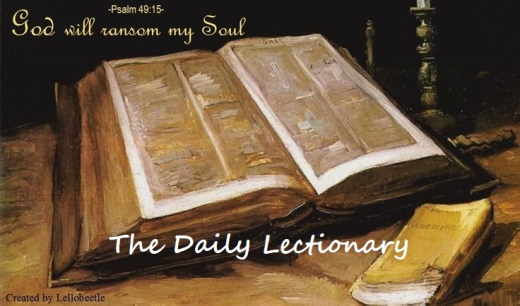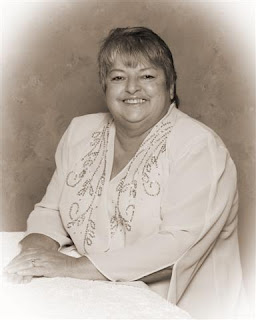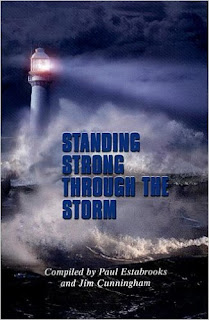The Daily Lectionary
FRIDAY, November 22, 2019
(Revised Common Lectionary Year C)
(Semi-continuous Reading Plan)
(God raises up a mighty savior)
68 “Blessed be the Lord God of Israel,
for he has looked favorably on his people and redeemed
them.
69 He has raised up a mighty savior for us
in the house of his servant David,
70 as he spoke through the mouth of his holy prophets from
of old,
71 that we would be saved from our enemies and from
the hand of all who hate us.
72 Thus he has shown the mercy promised to our ancestors,
and has remembered his holy covenant,
73 the oath that he swore to our ancestor Abraham,
to grant us 74 that we, being rescued from the hands
of our enemies,
might serve him without fear, 75 in holiness and
righteousness
before him all our days.
76 And you, child, will be called the prophet of
the Most High;
for you will go before the Lord to prepare his ways,
77 to give knowledge of salvation to his people
by the forgiveness of their sins.
78 By the tender mercy of our God,
the dawn from on high will break upon us,
79 to give light to those who sit in darkness and in
the shadow of death,
to guide our feet into the way of peace.”
(The covenant abandoned)
Exhortation to Repent
22:1 Thus says the Lord: Go down to the house of the king of Judah, and speak there this word, 2 and say: Hear the word of the Lord, O King of Judah sitting on the throne of David—you, and your servants, and your people who enter these gates. 3 Thus says the Lord: Act with justice and righteousness, and deliver from the hand of the oppressor anyone who has been robbed. And do no wrong or violence to the alien, the orphan, and the widow, or shed innocent blood in this place. 4 For if you will indeed obey this word, then through the gates of this house shall enter kings who sit on the throne of David, riding in chariots and on horses, they, and their servants, and their people. 5 But if you will not heed these words, I swear by myself, says the Lord, that this house shall become a desolation. 6 For thus says the Lord concerning the house of the king of Judah:
You are like Gilead to me,
like the summit of Lebanon;
but I swear that I will make you a desert,
an uninhabited city.
7 I will prepare destroyers against you,
all with their weapons;
they shall cut down your choicest cedars
and cast them into the fire.
8 And many nations will pass by this city, and all of them will say one to another, “Why has the Lord dealt in this way with that great city?” 9 And they will answer, “Because they abandoned the covenant of the Lord their God, and worshiped other gods and served them.”
10 Do not weep for him who is dead,
nor bemoan him;
weep rather for him who goes away,
for he shall return no more
to see his native land.
Message to the Sons of Josiah
11 For thus says the Lord concerning Shallum son of King Josiah of Judah, who succeeded his father Josiah, and who went away from this place: He shall return here no more, 12 but in the place where they have carried him captive he shall die, and he shall never see this land again.
13 Woe to him who builds his house by unrighteousness,
and his upper rooms by injustice;
who makes his neighbors work for nothing,
and does not give them their wages;
14 who says, “I will build myself a spacious house
with large upper rooms,”
and who cuts out windows for it,
paneling it with cedar,
and painting it with vermilion.
15 Are you a king
because you compete in cedar?
Did not your father eat and drink
and do justice and righteousness?
Then it was well with him.
16 He judged the cause of the poor and needy;
then it was well.
Is not this to know me?
says the Lord.
17 But your eyes and heart
are only on your dishonest gain,
for shedding innocent blood,
and for practicing oppression and violence.
(An imperishable inheritance)
A Living Hope
1:3 Blessed be the God and Father of our Lord Jesus Christ! By his great mercy he has given us a new birth into a living hope through the resurrection of Jesus Christ from the dead, 4 and into an inheritance that is imperishable, undefiled, and unfading, kept in heaven for you, 5 who are being protected by the power of God through faith for a salvation ready to be revealed in the last time. 6 In this you rejoice, even if now for a little while you have had to suffer various trials, 7 so that the genuineness of your faith—being more precious than gold that, though perishable, is tested by fire—may be found to result in praise and glory and honor when Jesus Christ is revealed. 8 Although you have not seen him, you love him; and even though you do not see him now, you believe in him and rejoice with an indescribable and glorious joy, 9 for you are receiving the outcome of your faith, the salvation of your souls.
Optional parts of the readings are set off in [square brackets.]
The Bible texts of the Old Testament, Epistle and Gospel lessons are from the New Revised Standard Version Bible, copyright 1989 by the Division of Christian Education of the National Council of the Church of Christ in the USA, and used by permission.
The Daily Lectionary is a three year cyclical lectionary. We are currently in Year C. Beginning with the first Sunday of Advent in 2019, we will be in Year A. The year which ended at Advent 2018 was Year B. These readings complement the Sunday and festival readings: Thursday through Saturday readings help prepare the reader for the Sunday ahead; Monday through Wednesday readings help the reader reflect and digest on what they heard in worship. Revised Common Lectionary Daily Readings, copyright © 2005 Consultation on Common Texts. www.commontexts.org
The Daily Lectionary for FRIDAY, November 22, 2019
Luke 1:68-79; Jeremiah 22:1-17; 1 Peter 1:3-9











